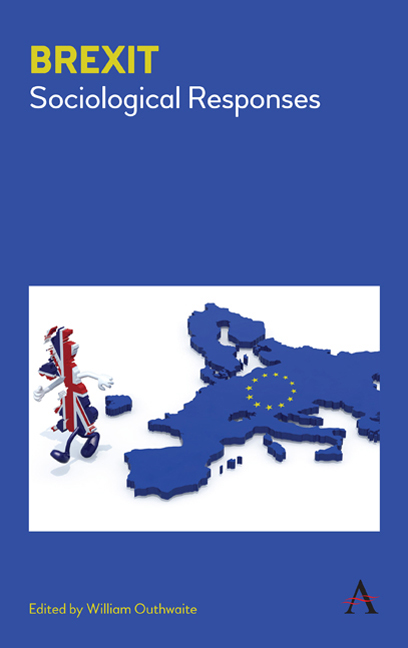Book contents
- Frontmatter
- Contents
- Preface
- Section 1 HOW DID IT HAPPEN?
- Section 2 THE POLITICS OF BREXIT
- Section 3 PROSPECTS FOR/ AFTER BREXIT
- Chapter Ten The EU and Brexit: Processes, Perspectives and Prospects
- Chapter Eleven The Impossibility of Disentangling Integration
- Chapter Twelve No Exit from Brexit?
- Chapter Thirteen Critical Theory, Brexit and the Vicissitudes of Political Economy in the Twenty- First Century
- Chapter Fourteen European Union versus European Society: Sociologists on ‘Brexit’ and the ‘Failure’ of Europeanization
- Notes on Contributors
- Index
Chapter Ten - The EU and Brexit: Processes, Perspectives and Prospects
from Section 3 - PROSPECTS FOR/ AFTER BREXIT
Published online by Cambridge University Press: 10 January 2018
- Frontmatter
- Contents
- Preface
- Section 1 HOW DID IT HAPPEN?
- Section 2 THE POLITICS OF BREXIT
- Section 3 PROSPECTS FOR/ AFTER BREXIT
- Chapter Ten The EU and Brexit: Processes, Perspectives and Prospects
- Chapter Eleven The Impossibility of Disentangling Integration
- Chapter Twelve No Exit from Brexit?
- Chapter Thirteen Critical Theory, Brexit and the Vicissitudes of Political Economy in the Twenty- First Century
- Chapter Fourteen European Union versus European Society: Sociologists on ‘Brexit’ and the ‘Failure’ of Europeanization
- Notes on Contributors
- Index
Summary
Brexit is an unprecedented challenge for both Britain and the European Union (EU). Elsewhere in the EU the question of Britain's continued membership has often been crowded out by concerns about the unity of the eurozone, the stability of Schengen, of security relations vis- à- vis Russia and a wealth of other significant problems such as Europe's productivity and demographics. The idea of actively contemplating a member state withdrawing has also been a taboo. And like the boy who cried wolf in the Aesop fable, threats by British politicians to leave the EU had by the time of the referendum campaign become so commonplace that they sounded increasingly hollow. But as the fable teaches us, the wolf eventually appeared. It should therefore be no surprise that planning for Brexit on all sides was minimal.
To appreciate the impact Brexit is having on the EU, we need to examine the political and diplomatic processes Brexit has created or triggered. Since the 23 June vote the world has witnessed 13 interrelated negotiations and debates unfold in both Britain and the rest of the EU. From the start they have been dogged by questions about the future of the UK, the EU's own unity and direction of travel, leadership at both the national and international level, and trust and solidarity at and between the different actors. These processes by which Brexit is handled could easily see relations on all sides sour due to conflicting perspectives over the future political, economic and security relationships within the UK, between the UK and the EU and within the EU. The end result could be acrimony, division and damage to all sides. The prospect of a ‘harsh Brexit’ in which relations on all sides deteriorate should not be ruled out. At the same time we should not rule out the prospect of a harsh Brexit helping create a crisis that in the longer run leads to a positive outcome by forcing necessary changes to the EU and European politics.
The lack of planning in the UK for Brexit was in part the result of British debates being largely focused on what new UK- EU deal would most benefit the UK. This myopic approach largely ignored how the rest of the EU might respond to Brexit and what a changed EU could mean for the UK.
- Type
- Chapter
- Information
- BrexitSociological Responses, pp. 127 - 138Publisher: Anthem PressPrint publication year: 2017

